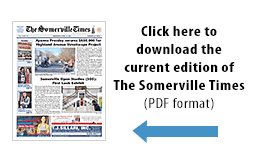 By Joseph A. Curtatone
By Joseph A. Curtatone
(The opinions and views expressed in the commentaries of The Somerville News belong solely to the authors of those commentaries and do not reflect the views or opinions of The Somerville News, its staff or publishers.)
As Somerville discusses whether or not to adjust the compensation of its non-union employees (who have gone six years without a change), as we prepare to vote on the Community Preservation Act (Question 4 on the November 6 ballot), and as we press ahead with transit-oriented development projects at Assembly Square and Union Square, there seems to be an unexpected question emerging about our city’s identity: In the family of Massachusetts cities and towns, is Somerville truly a first-tier community, or are we too constrained – by population, by physical area, by tax base, or by some other key indicator – to be considered on a par with Boston, Cambridge, Newton, Brookline, etc?
Somerville residents are, as a whole, intensely and justifiably proud of their community. Yet in the debates about current city policy and community planning, we’re hearing concerns about Somerville’s ability to be a top-ranked municipal player. For example, there are some observers who think that Somerville should dial back, or even hold off, on Union Square revitalization because Assembly Square isn’t done yet, as if Somerville lacked the capacity to manage more than one major development initiative at a time.
Some critics apparently believe that Somerville shouldn’t worry about paying salaries for non-union employees that are competitive with Cambridge or Newton because we don’t have per capita tax revenues as high as those communities, as if Somerville just can’t afford (or isn’t entitled to) the best workers and should settle for something less.
I’ve heard opposition to the Community Preservation Act proposal on the November 6 ballot (Question 4) on the grounds that our commitment to compensate employees and invest in economic development somehow means that no further dollars should be invested anywhere else, and that therefore the city shouldn’t take advantage of an additional opportunity to raise funds specially dedicated to investments in historic buildings and open space. (The way this gets phrased is “They’ve got all the money they need. They don’t need any more.”)
When you add up these concerns (or complaints) what you get is a theory that, as a community, Somerville has gotten ahead of itself. Our high expectations are unrealistic. We should make do with what we have and scale back on our sense of the possible.
Now, it’s one thing to argue the need for fiscal prudence: There are real limits to how aggressive Somerville can and should be in spending taxpayer dollars, and we ignore those limits at our peril. But, as I noted in this column just last week, Somerville currently spends fewer local tax dollars per capita than any community in Massachusetts with a population of 3,000 or more. Our bond rating is the highest in the city’s history not simply because we have established rain day and capital stabilization funds but because we have invested in growing our commercial tax base with sustainable, transit-oriented economic development. Our budget is balanced.
We still have to be careful, no doubt about it. But it ‘s wrong to say that we should settle for a second-rate workforce, or a second-rate development agenda because of some misguided notion that we’re just too puny and insignificant to play with the big kids. That kind of inferiority complex is completely unwarranted given what our community has achieved over the past 25 years, and, what’s worse, it can be self-fulfilling.
Somerville has to live within its means, but our continued success as a community depends on a willingness to expand those means through investments in our municipal infrastructure (including our workforce), in our services, our schools, our libraries, our parks and our recreational facilities, our shared cultural resources and our community celebrations.
Somerville will not thrive if its goal is simply to do well enough to get by. Many of the things we love about our city – its diversity, its eclectic and engaging neighborhoods, its rich and varied urban lifestyle – are definitely worth protecting and preserving. But we can’t just stand in place: we have to be going forward with confidence and energy or we will decline and fall back.
That’s why I would argue that we should commit ourselves to recruiting and retaining a capable, professional municipal workforce that can deliver the productivity we need on a budget we can afford.
That’s why I would argue that we can move ahead with the financing of a redevelopment plan for Union Square that will bring in more commercial tax revenue and generate local job opportunities for decades to come.
That’s why we need to vote Yes on Question 4, and endorse the 1.5 percent Community Preservation Act tax surcharge on our tax bills (the tax bills, not the tax rates) that will significantly boost the dollars available for parks, for repairs to historic school and library buildings and support the affordability of Somerville housing.
We will never be as big as Boston, but so what? Our tax base may never be as big as those as those in Cambridge or Newton (but don’t bet on that just yet). We will never have the generous open spaces of our more distant suburban neighbors.
But Somerville is a first-rate city, and has been for years. We are, and will remain, in the first rank of innovation, prosperity, opportunity and quality of life just as long as we believe in ourselves and act on that belief.












Reader Comments